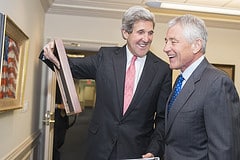McClatchy is among the last objective mainstream media sources. The news service actually bothers to question conventional wisdom and do actual reporting. Yesterday it published a devastating deconstruction of the Obama administration’s “evidence” animating its push to war on Syria.
Clearly, the Obama “evidence” is far, far more flimsy than the Bush administration’s dog and pony show in the lead up to Iraq.
Writes the McClatchy report:
The Obama administration’s public case for attacking Syria is riddled with inconsistencies and hinges mainly on circumstantial evidence…
The case Secretary of State John Kerry laid out last Friday contained claims that were disputed by the United Nations, inconsistent in some details with British and French intelligence reports or lacking sufficient transparency for international chemical weapons experts to accept at face value.
The McClatchy report takes down the administration’s claims one-by-one, starting with its dismissal of the UN inspection team’s mission to collect and securely transport evidence at the scene of the August 21 incident. Kerry dismissed the UN collection effort in favor of his own undisclosed collection methods (read: samples from the Syrian opposition) because “too much time had elapsed” from the date of the incident for accurate samples to be collected.
But, notes the report, “two human rights groups dispatched a forensics team to northern Iraq in 1992 and found trace evidence of sarin as well as mustard gas – four years after a chemical attack.”
Others, including UK and US experts also dismiss Kerry’s claim as absurd.
And what of the US claim that it had seen the Syrian government preparing to launch the attack days before it occurred? Either this was another fabricated claim, or the US decided to sit idly by and watch 1,400 innocent Syrians (by US numbers) be slaughtered by their government. To get a war omelet a few eggs needed cracked? It seems almost like accessory to the crime.
The McClatchy report points out that the US had issued warnings in previous similar situations but somehow decided to sit this one out. Perhaps it was as explained in the late 2011 Wikileaks STRATFOR document, where an employee of that organization recounted a discussion with US military officials agreeing that they “don’t believe air intervention would happen unless there was enough media attention on a massacre, like the Ghadafi move against Benghazi.”
Like magic, it seems the administration has gotten its Banghazi!
Russian Foreign Minister Sergey Lavrov has repeatedly asked Washington to share its evidence that the attack came from Syrian government sources. Conclusions and “trust us” are not enough; the Russian government understandably wants to see the facts. But, said Lavrov, “when we ask for further clarification, we receive the following response: ‘you are aware that this is classified information, therefore we cannot show it to you.’”
The reason Washington finds itself without allies (save for the French government, which lately puffs up with confidence when big brother Washington provides back-up) in its push for war on Syria is that all of its allies are genuinely embarrassed at how flimsy the case for war really is. Democratic National Committee Chairman Debbie Wasserman-Schultz claims that the US actually has “dozens” of allies in its coalition of the willing to attack Syria. But the reason we have not heard from any of them? They are secret. Like the US government evidence.

